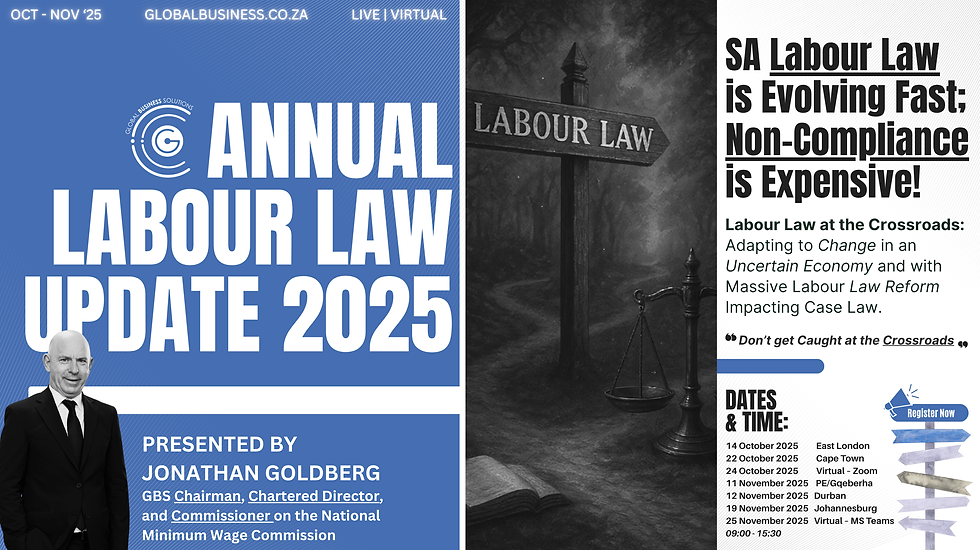Consequences of Swearing at Your Boss: Legal Principles and the Role of the Amygdala Hijack
- John Botha

- Nov 4, 2025
- 3 min read

Verbal outbursts at work often feel impulsive—an emotional reaction that happens before rational thought takes over. In employment law, however, emotional loss of control is seldom an excuse for misconduct. This tension between human psychology and legal accountability is vividly seen in disciplinary cases where employees swear at senior managers.
Key Legal Principles
Gross Misconduct:
Using aggressive or profane language toward senior management is considered gross misconduct. When directed at an executive or CEO, the conduct reflects a breakdown in trust and may fairly result in dismissal.
Challenge to Authority:
Insults to top leadership are viewed as acts of insubordination and a direct challenge to the employer’s authority. Such actions undermine organisational discipline and cannot easily be tolerated.
Procedural Fairness:
Even in cases involving heated emotional exchanges, employers must still follow fair procedures—investigating allegations, providing a hearing, and testing evidence objectively.
Burden of Proof:
The employer must prove the words were spoken, the act was intentional, and contextual factors justified the sanction of dismissal.
Mitigating Factors:
While personal stress, provocation, or remorse can be considered, substantiated verbal abuse generally outweighs these in determining sanction fairness.
Case Summary (Jenecker v SA Medical and Education Foundation NPC and Others (C611/2022) [2025] ZALCCT 104 (17 October 2025))
Aspect | Facts | Outcome | Lesson |
Incident | Employee allegedly shouted “screw you” at the CEO during a confrontation about lateness. | Dismissal for gross misconduct upheld. | Verbal abuse toward senior management undermines authority and disrupts workplace order. |
Defence | Employee denied the statement, citing Christian beliefs; family members testified in support. | Court preferred employer’s witnesses and upheld dismissal. | Personal values do not override credible, consistent evidence. |
Legal Process | Disciplinary hearing, CCMA arbitration, and Labour Court review. | All upheld the fairness of the dismissal. | Fair procedure and consistent testimony safeguard employers from unfair dismissal findings. |
Judicial Commentary | Repeated disrespect to the CEO was described as a “serious challenge to authority”. | Dismissal deemed lawful and proportionate. | Respect is central to workplace discipline and employment law. |
The Amygdala Hijack Explained
The term “amygdala hijack,” coined by psychologist Daniel Goleman, describes a sudden emotional response triggered by perceived threat or provocation. The amygdala, the brain’s emotional centre, overrides the rational prefrontal cortex, leading to impulsive fight-or-flight reactions such as shouting, swearing, or aggression.
In the workplace, an amygdala hijack might occur when an employee feels unfairly accused or humiliated, particularly by someone in authority. The emotional surge bypasses reasoning, and angry words are spoken before the employee realises the potential consequences.
However, from a legal perspective, this psychological explanation does not excuse misconduct. Labour courts acknowledge human emotion but evaluate whether the conduct undermined workplace authority, affected trust, or breached rules known to employees. Emotional distress may mitigate sanction only if the response was brief, provoked, and followed by genuine remorse.
Integrating Psychology and Legal Accountability
The amygdala hijack helps explain why employees sometimes lose control, but it does not excuse what they do.
Legal systems require accountability: employees are expected to regulate emotional responses, especially in hierarchical contexts.
Employers, in turn, can benefit from understanding these triggers to improve conflict management and leadership communication. Training supervisors on emotional intelligence reduces the likelihood of confrontational incidents escalating to dismissals.
Practical Takeaways
For employees: Pause before reacting. A momentary restraint can prevent career-ending consequences.
For employers: Maintain procedural fairness but remain firm when authority is intentionally undermined.
For leaders: Cultivating emotional intelligence can prevent amygdala hijack moments—both your own and your employees’.
Join us at the Annual Labour Law Update. This year's theme is Labour Law at the Crossroads: Adapting to Change in an Uncertain Economy and with Massive Labour Law Reform Impacting Case Law. What you'll gain:
Master the Digital Transformation of Labour Law in 2025
200+ Labour Law Cases Unpacked by Jonathan Goldberg
Critical Updates on Upcoming Legislation & NEDLAC Amendments
Navigate Workplace Challenges from the Digital Era to Discrimination Laws

View our upcoming events: Upcoming Events, like Landmark Judgment: Equal Parental Leave for All Parents, Managing Absenteeism in the Workplace, and #ALLU2025.
*All workshops are offered as customised in-house training that can be presented virtually or on-site.
"Global Business Solutions (GBS)—Your Partner in Strategic HR Compliance"




Comments